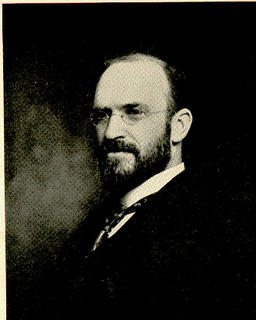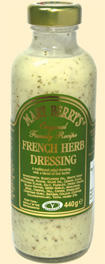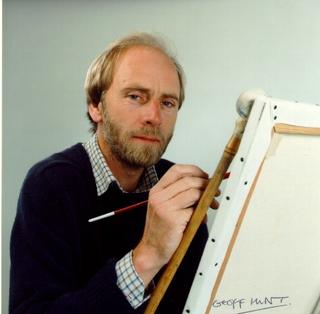The man who made libraries user-friendly
Also in today's blog
Biographers beaten by scientists
Discovering a cookery writer
UKNovelists and Pearl Buck
Geoff Hunt's covers for Patrick O'Brian
Who Else Writes Like…?
The man who made libraries user-friendly
How many public library users have heard of
Melvil Dewey, theAmerican librarian [1851-1931] who devised the world's most widely used library classisfication system? My guess is hardly any.

The Dewey system was explained to me by a kindly public librarian while I was still at school, but it was not until last weekend, after posting the August 21 blog, that I went in search of a portrait of the system's creator and learned a lot more about him. For example -
"The Melvil Dewey Medal was first given in 1975. It is presented to members of the ALA [American Library Association] who have excelled in the fields of library management and education, cataloging and classification, and tools and techniques of librarianship. The award is named for Melvil Dewey, the "father of modern librarianship" and the creator of the Dewey Decimal Classification System. Dewey created the system in 1873 and it is now in use in more than 135 countries."
Biographers beaten by scientists
After a promising opening sequence showing Biographers' Club members dining together, it was a disappointment that the Club team taking part in University Challenge on British BBC2 TV last Monday evening made a poor showing against the New Scientist team.
Captained by Neil McKenna, the biographers included Sarah Bradford from whose bio on the Club's site this is an extract -
"She worked in the Manuscript Department of Christie’s London, travelling for the Department and valuing manuscripts from the fifteenth to twentieth centuries, an experience which enabled her to write Cesare Borgia (used by the BBC as the source of their series ‘The Borgias’, for which she wrote the novelisation of the scripts) and, most recently, Lucrezia Borgia. Her other biographies include Disraeli, named Book of the Year by the New York Times, Princess Grace, written with the cooperation of Prince Rainier and the Kelly family, George VI (published in the United States as The ReluctantKing) which his daughter, the Queen, is said to keep on her desk, Splendours and Miseries, The Life of Sacheverell Sitwell, written at the request of the writer’s family who made the archives available to her for the first time, two international bestsellers, Elizabeth, a Biography of Her Majesty the Queen, and America’s Queen, The Life of Jacqueline Kennedy Onassis."
Discovering a cookery writer
On Tuesday I was bidden to lunch in sunny garden. After I'd complimented my hostess on the delicious dressing on the mixed salad leaves served in a big wooden bowl, she produced an elegant bottle labelled Mary Berry's French Herb Dressing.


Although, inexplicably, I had never heard of Mary Berry until that moment, as soon as I got home I found her website where I read
"Established as one of the most trusted and respected cookery writers around the world, Mary Berry has written over 60 books, netting sales of over five million copies world-wide. In January 2004, Mary was voted Top 3 by BBC Good Food for the category “Most Reliable Celebrity Cook Book”, alongside Jamie Oliver and Delia Smith."
UKNovelists and Pearl Buck
UKNovelists is a private online forum with 45 members. While I was delighted to see four of them on the Top 20 Fiction Heatseekers list in this week's issue of The Bookseller, spotting the name of a long-dead favourite author was even more of a thrill.
The UKNovelists on the Heatseekers list, not for the first time, were Elizabeth Chadwick at No 2, Sophie King at No 3, Annie Groves at No 8 and Anna Jacobs at No 16.
Apparently Pearl Buck's The Good Earth [Pocket] was listed last week at No 11, but I missed it. This week it's shot up to No 4. Looking for the title at Amazon, I read
Though more than sixty years have passed since this remarkable novel won the Pulitzer Prize, it has retained its popularity and become one of the great modern classics. "I can only write what I know, and I know nothing but China, having always lived there," wrote Pearl Buck. In The Good Earth she presents a graphic view of a China when the last emperor reigned and the vast political and social upheavals of the twentieth century were but distant rumblings for the ordinary people. This moving, classic story of the honest farmer Wang Lung and his selfless wife O-lan is must reading for those who would fully appreciate the sweeping changes that have occurred in the lives of the Chinese people during this century.
Nobel Prize winner Pearl S. Buck traces the whole cycle of life: its terrors, its passions, its ambitions and rewards. Her brilliant novel -- beloved by millions of readers -- is a universal tale of the destiny of man.
Long ago, as a little girl, I used to be taken to the cinema by one of my ancient great-uncles who had served in the Ashanti wars, on the North West Frontier in India and later at Gallipoli and was deeply bored by his long retirement. One of the movies we saw together was The Good Earth, starring Paul Muni. Most of it was over my head but later, in my teens and twenties, I read all Pearl Buck's books and this week ordered the Pocket edition of The Good Earth in the hope that re-reading them, knowing what I know now, will be even more pleasurable than it was the first time.
Geoff Hunt's covers for Patrick O'Brian
The endpapers of The Final Unfinished Voyage of Jack Aubrey, the twenty-first book in Patrick O'Brian's famous series, of which he had hand-written 65 pages when he died in January 2000, consist of 20 of Geoff Hunt's superb cover-paintings and a photo of O'Brian.

I borrowed this interesting book from the Guille-Allès public library where, recently, my sofa-sharer borrowed a couple of videos.
We were both deeply bored by the video of Charles Dicken's The Old Curiosity Shop.
Parts 1-3 of Anthony Powell's A Dance to the Music of Time were just about watchable, but Part 4 was terrible. I have never got around to reading the novels which always sounded self-consciously literary and riddled with snobbery. Perhaps I'll try one, if only to see if it's better or worse than the TV adaptation in which Widmerpool's wife came over as possibly the most obnoxious woman in 20th century fiction. The mystery I have yet to solve is why, when all the other characters were aged by the make-up department, Simon Jenkins was played by a different actor in Part 4.
However, if and when we invest in a DVD player, I should like to watch Geoff Hunt : Portrait of a Marine Artist described thus -
"Widely recognized as contributing to the success of the O’Brian series, Geoff Hunt has gone from well-known illustrator to become one of the foremost marine fine artists in the world today. His paintings are sought after by private collectors and exhibited in museums throughout the world. Exquisite in their detail and historical accuracy, Geoff Hunt’s paintings reveal a lifelike depiction of the sea and the light radiating from the sky.
This visually stunning documentary offers rare insight into the brilliant artist. Hunt discloses how he develops the incredible detail and historical accuracy in his paintings and how a sailing adventure added to his ability to portray the feeling of the sea. Covered in the documentary are: 1) Early life 2) Work as an illustrator 3) Voyage on yacht Kipper 4) Patrick O’Brian 5) Creativity and research 6) Log books 7) Rigging 8) The eye line 9) "Master and Commander…" 10) Lord Nelson 11) American Revolutionary War Navy 12) New Age of Square Sail 13) Royal Society of Marine Artists 14) Working in studio 15) Painting technique16) Painting the sea 17) Painting session in his studio."
Who Else Writes Like…?
The fifth edition of this book, listing 1,875 authors, is now out. After consulting the previous edition at the public library, I discovered I had the third and fourth editions on my own shelves. Edited by Roy and Jeanne Huse, the books are published by LISU [Library and Information Statistics Unit] Loughborough University.
According to the 4th edition, fans of Patrick O'Brian should try Tom Connery, David Donache, C S Forester, Richard Howard, Jonathan Lunn, Allan Mallinson, Jan Needle, James L Nelson, Marcus Palliser, Dan Parkinson, Showell Styles and Victor Suthren.
Of those authors, the only one I have read is C S Forester whose books are not a patch on O'Brian's.
Another of my favourite authors, Ann Bridge, isn't listed, which seems an extraordinary oversight, particularly as, judging by their photographs in a press release I received with the 4th edition, Mr and Mrs Huse are old enough to remember Ann Bridge.
Coming next Sunday…maybe
The best book I've read this year
Karin Slaughter's thrillers
More on the value of famous people's letters
Advice from a New York literary agent
Arabella [Does My Bum Look Big In This?] Weir
If you're thinking that some of these items have been listed for a long time without materialising, the reason is a week on the web produces so much of interest, I have a hard time packing it all in and frequently overrun my intended limit of 1,000 words.
Re UKNovelists, mentioned above, Michelle Styles a fellow member of the forum which is open to all novelists published in the UK, took the trouble to alert me to the fact that this blog had been spammed via the Comment button. She also told me how to avoid more spamming.
If you wish to respond to any part of today's blog, you can hit the comment button or email me direct.
